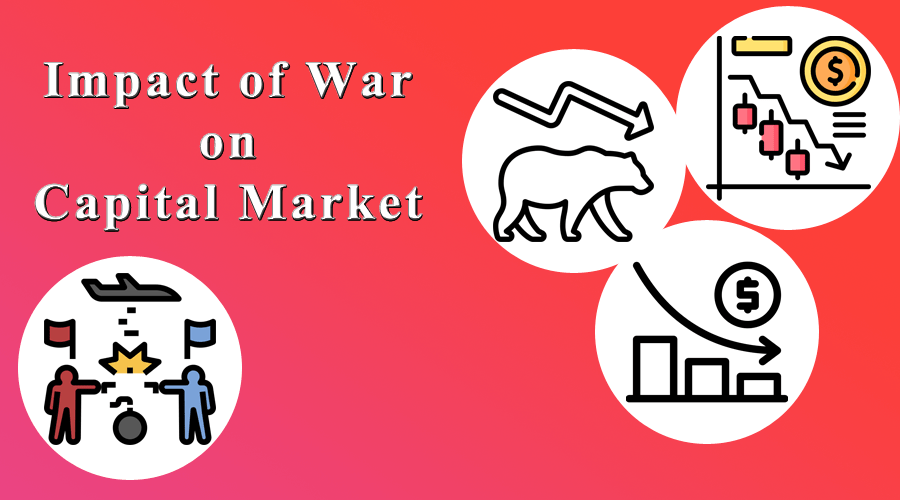Impact of War on Capital Market

War, a catalyst for destruction, leaves an indelible mark on the global economy.
War impacts capital markets in a complicated manner because economic, psychological, and geopolitical factors are connected closely and effect on one sector affect other sectors as well. History and research reveal a consistent pattern: wars create uncertainty and volatility in financial markets. This uncertainty causes an initial price drop in stock markets, followed by scenarios of recovery as the situation stabilizes and markets adjust to new realities.
Historical Context of War and Capital Markets
Most of the big impacts on stock market performance in history are caused by war. For instance, when the First World War broke out in 1914, stock prices collapsed by an incredible 30 per cent, which forced markets to close for a period of four months. When they reopened, the Dow Jones Industrial Average surged by more than 88 per cent within just a few months. That happened again during World War II, when the market initially declined but later appreciated by 50% between 1939 and 1945.
The Gulf Wars in the early 1990s followed a different trajectory. For sure, they caused some temporary market tsunamis, but the overall carnage was limited compared to the World Wars. The market performance during this period come close to historical averages, but the extent to which the market was thrown into turmoil can depend on the nature and scale of conflict.
Financial Market Reactions to War
Researchers have studied the effect of wars on financial markets and constantly it reacts badly to war anticipation. It is known that stock prices, as the likelihood of conflict rises, usually fall because of increased uncertainty in the economy. However, usually, when war officially breaks out it’s kind of paradoxical. The market sometimes shows some upturn because the investors are more able to see what is going on, and this unease reduces influence on their decisions. This phenomenon, commonly referred to as “the war puzzle,” is an example of how mere anticipation of strife can drive markets down; actual war declaration can surprise agendas with a rebound associated with stock prices.
Sector-Specific Impacts
It is not commonly known as; the effects of war are not felt on the same way by every sector of an economy. Studies have shown that wars would generally decrease equity value across industries, with the effects being most serious for consumer discretionary like airlines and technology sectors. For instance, conflicts cause people to focus on top priorities goods that cause them to avoid the expenditure of non-discretionary items; hence it severely hits up consumer discretionary stocks. On the other hand, reduced amount of travel along with operational risks lead to significant discomfort within the airline business.
Some areas, on the contrary, have good time during war such as energy and gold. In fact, gold prisms are often called a “safe haven.” Investors buying gold expect that it will generally appreciate at times of uncertainty since they consider it as an investment-protecting asset. Stocks in energy may increase, thanks to increased demand and geopolitical tensions influencing the oil supply. Countries closely hooking into the global economy or generally net importers of oil, as in Turkey and Israel, will suffer worse effects from war compared to other countries. Stock markets in such countries are highly sensitive again to regional conflicts.
Long-Term Consequences
War generally creates a temporary decline in stock prices, but the long-term possibilities are very different. Some studies claim that the markets can recover to pre-war levels within a year and a half. However, the extent of recovery depends significantly upon the general economic conditions before the war began. Generally, such economies with sound fundamentals tend to recover quickly over time when the war shock hits.
In addition, governments can spend in such a manner during wartime that certain sectors, mainly defense contractors, benefit from the positive actions of the market in those areas. Companies whose business is related to military equipment production see hikes in their stock prices as they receive government contracts since these contracts will increase their sales, even if the overall market is performing poorly.
Psychological Factors
It is the investor psychology that matter significantly how markets would react to wars. Fear of war would lead to a corresponding “risk premium” as the investor or buyers would expect additional income from ever-increasing uncertainties. This psychological consideration would at times lead to hasty reactions by the markets producing initially sharp selloffs that do not reflect the longer-term economic realities. Thus, it is valuable for investors to recognize this psychological ingredient so that it underscores the need to manage one’s emotions and continue to think long term even during periods of geopolitical tension.
Conclusion
To sum it up, the influence of war on capital markets takes numerous forms, such as immediate reactions involving volatility and uncertainties, sector-specific responses, and different long-term recovery patterns. As seen from historical trends, wars are usually followed by initial declines in share prices before recovering through time by the general economic conditions and investor sentiments. Investors, therefore, have to comprehend these dynamics in order to face the complexities of geopolitical events while making intelligent choices in the midst of uncertainties.